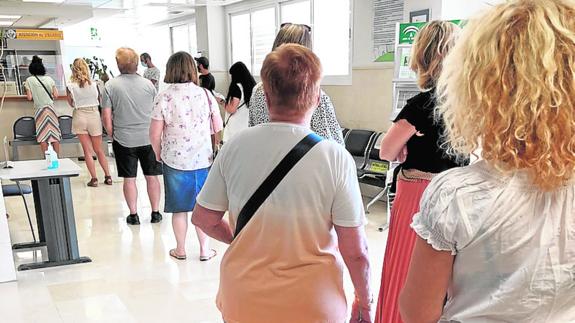Getting a doctor's appointment this summer has become a real ordeal
Many health centres across Malaga province have been overwhelmed by the coronavirus situation and it can take up to 14 days to speak to your doctor on the phone
Ángel Escalera
Lunes, 14 de septiembre 2020, 16:26
The coronavirus has been causing major problems at health centres in Malaga province, where there is more work than staff can handle and a lack of available materials.
It can take up to 14 days to get an appointment just to talk to a GP over the phone, there are long queues of patients waiting to see their doctor in cases where the appointment cannot be put off, it is impossible to ring some health centres because the phones are constantly engaged, and those who try to make an appointment through the Salud Responde app are often given the message that "there are no appointments available at your health centre for the next 14 days".
In addition, there are not enough professionals to trace those who have been in contact with someone who has tested positive for Covid-19; many patients whose illnesses are unrelated to coronavirus are having to wait for appointments because there are not enough doctors to handle the workload; and, in general, anger and frustration are growing among medical staff as well as users.
These problems have lit a red warning light in primary health care. The situation is very difficult and urgent measures are needed to prevent health centres becoming totally overwhelmed and to ensure that getting an appointment to see a doctor is no longer an ordeal.
Giving a bad impression
"We have gone from applause on balconies to insults on social media," one GP told this newspaper, referring to the number of complaints about the way the service is operating. "Even though we are working harder than ever, we are giving a very bad impression. People think we're not making any effort, but in fact it is the complete opposite". He said the problem is due to a lack of doctors and telephone lines to enable people to contact their health centre.
"Patients try to ring their health centre and nobody answers the phone, either because all the lines are busy or there aren't enough staff to attend to the phone calls. When you add in the problems when people try to ring Salud Responde, they get fed up and think we are not meeting our obligations," said another doctor.
When the coronavirus first appeared, the Andalusian Health Service (SAS) introduced a telephone consultation system to avoid people having to go to the health centres and possibly spreading the infection. The GPs talk to the patient, evaluate each case and agree to see them if they think it necessary. There is a system for consultations for patients whose medical conditions mean they cannot wait to see their doctor.
Queues form outside entrances
Because it is so difficult to get through on the phone, more people are now going to the health centres and saying they are eligible for an appointment because their condition means they cannot wait. As there is a filtering system in the health centres to reduce the chances of infection from the virus, queues form outside the entrances. This leads to complaints from patients and overwhelms centres which are having to try to cope without sufficient resources.
The problem intensified during the summer because many health centres had even more work due to staff holidays.
"Normally there are 10 doctors here, but for several weeks four or five were away. Because of that, the backlog of appointments just got a whole lot worse," said one GP.
The lack of staff also affects nursing, admissions and administrative staff, who have to cover the workload without the people they need in an exceptional situation such as the SARS-Cov-2 pandemic.
The answer would be to take on more workers, but there are no doctors, nurses and administrative staff available, according to health service sources, who say it is not a matter of money but the fact that there are no professionals to contract.
"We are leaving no stone unturned to find more staff, but there just aren't any," they say. The authorities are now studying the possibility of contracting qualified workers who are not on the health service's list.
The Junta de Andalucía's health minister, Jesús Aguirre, admits that there are problems in making appointments to see GPs in some areas, and apologises "for the occasional situations in which health centres were overwhelmed at the end of August".
He is confident that things will start to return to normal this month as staff come back to work after their holidays. He also says the health centres were obliged to start doing things a different way because of the pandemic, and praised them for doing "a great job".
